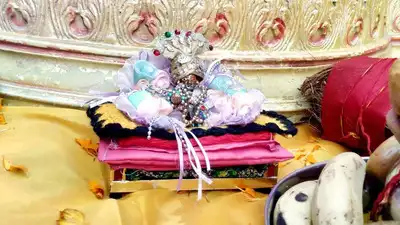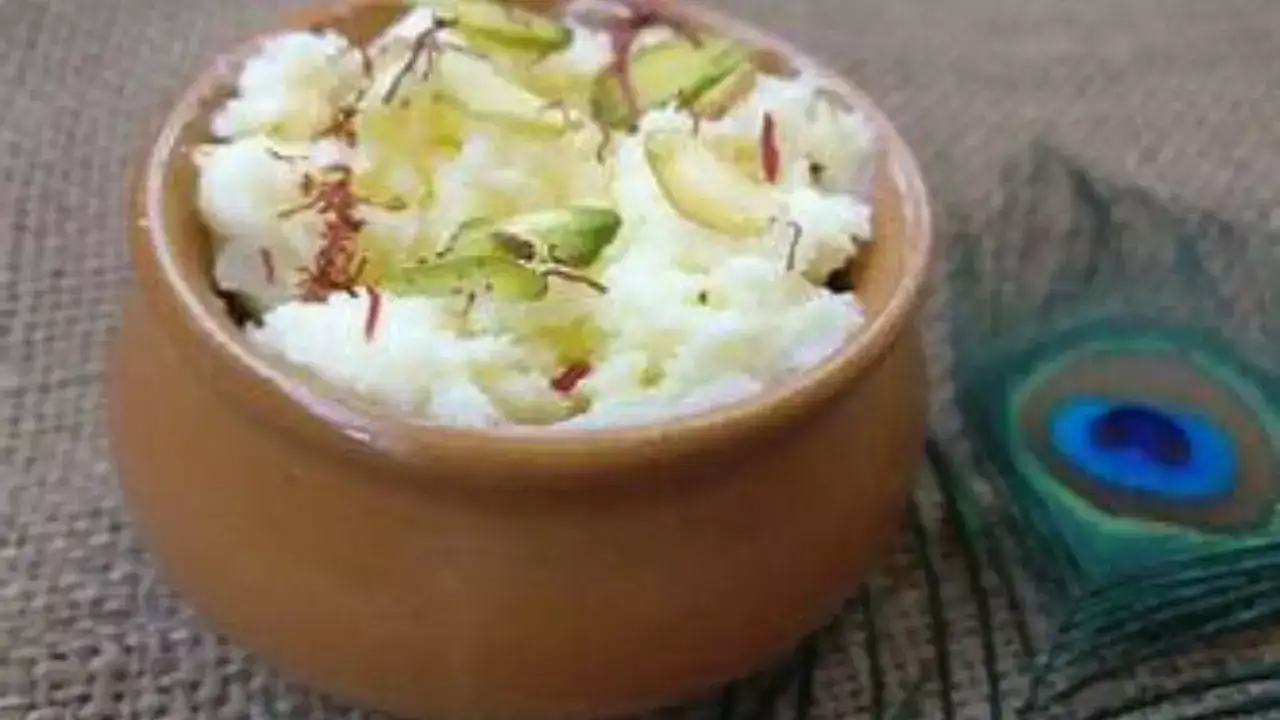ARTICLE AD BOX

KrishnaJanmashtami, celebrating the birth of Lord Krishna, is a festival full of devotion, joy, and special rituals. A key part of this celebration is preparing bhog, sacred food offerings made with pure, traditional ingredients to honour Krishna.
These dishes are not only delicious but also carry deep spiritual meaning, symbolising love and gratitude. From creamy butter treats to sweet rice puddings and refreshing snacks, each recipe reflects Krishna’s favourite flavours and customs. Making and offering these divine recipes during Janmashtami is believed to invite blessings of health, happiness, and prosperity for devotees and their families.
Divine Krishna Janmashtami bhog ideas: 7 recipes to honour Lord Krishna
Makhan Mishri

Butter, known as makhan, was Lord Krishna’s favourite food, which earned him the nickname ‘Makhan-Chor’ (Butter Thief).
The combination of fresh butter and rock sugar (mishri) is a classic offering that symbolizes purity and sweetness. On Janmashtami, devotees prepare this simple yet divine dish to honor Krishna’s love for butter.Ingredients:Full-fat milk or fresh creamRock sugar (mishri)How to prepare: Churn full-fat milk or fresh cream to extract fresh butter. Once the butter is ready, mix in the rock sugar gently. This creamy and sweet mixture is then offered to Lord Krishna as bhog, and after the offering, it is shared as prasad with family and friends.
Panchamrit
Panchamrit is a sacred concoction made by blending five pure ingredients: milk, curd, honey, ghee, and sugar. This mixture is considered holy and is commonly used in Hindu rituals. The five elements combine to create a nourishing and auspicious drink that is perfect for Janmashtami celebrations.Ingredients:
- Milk – 1 cup
- Curd (yogurt) – 1 cup
- Honey – 2 tablespoons
- Ghee – 1 tablespoon
- Sugar – 1 tablespoon
How to prepare: In a bowl, combine milk, curd, honey, ghee, and sugar. Stir well until all ingredients blend smoothly. This sweet, creamy nectar is then offered to Krishna during the prayers.
Sabudana Khichdi (Sago Pearl Delight)
Sabudana khichdi is a light, nutritious dish made from sago pearls. It is widely enjoyed during fasts, including those observed on Janmashtami. This dish provides energy without feeling heavy, making it an ideal offering and festive meal.Ingredients:
- Sabudana (sago pearls) – 1 cup
- Peanuts – 2 tablespoons
- Boiled and cubed potatoes – 2 medium
- Green chilies (finely chopped) – 2
- Cumin seeds – 1 tablespoon
- Ghee – for frying
- Salt – to taste
How to prepare: Rinse sabudana thoroughly and soak it for 4-5 hours or overnight to soften. Heat ghee in a pan, add cumin seeds, green chilies, and peanuts, and fry until golden. Add the boiled potatoes and sauté for a few minutes.
Then add the soaked sabudana and cook until the pearls turn translucent. Season with salt, and the dish is ready to be offered to Krishna.
Malpua (Sweet Pancakes)
Malpua is a delicious dessert made of deep-fried pancakes soaked in sugar syrup. The combination of crispy edges and soft interiors soaked in sweetness makes it a favourite during festivals like Janmashtami.Ingredients:
- All-purpose flour – 1 cup
- Semolina – ½ cup
- Milk – ½ cup
- Sugar – ¼ cup
- Fennel seeds – ¼ teaspoon
- Ghee – for frying
- Sugar syrup (prepared by boiling sugar and water)
How to prepare: Mix the flour, semolina, milk, sugar, and fennel seeds into a smooth batter.
Heat ghee in a pan and pour ladlefuls of batter to make small pancakes. Fry them until golden brown on both sides. Soak the fried malpuas in warm sugar syrup for a few minutes, then offer them to Krishna.
Gopalkala (Krishna’s Favourite)
Gopalkala is a refreshing and wholesome dish made with beaten rice (poha), yogurt, cucumber, and spices. It is traditionally offered to Krishna as bhog and is known for its light yet satisfying taste.Ingredients:
- Poha (beaten rice) – 1 cup
- Yogurt – ½ cup
- Cucumber (finely chopped) – 1
- Grated coconut – 1 tablespoon
- Green chili (finely chopped) – 1
- Cumin seeds – 1 tablespoon
- Ghee – 1 tablespoon
- Salt – to taste
How to prepare: Rinse the poha and drain excess water.
Mix it with yogurt, chopped cucumber, green chili, and grated coconut. Heat ghee in a pan and fry cumin seeds until they splutter, then pour this over the poha mixture. Add salt and mix well before offering the dish.
Kheer (Rice Pudding)
Kheer is a traditional, creamy rice pudding flavoured with cardamom and garnished with nuts and raisins. It is a staple during many Indian festivals and is loved for its rich, comforting taste.Ingredients:Basmati rice – 1 cupFull-fat milk – 1 litreSugar – ½ cupCardamom powder – ¼ teaspoonChopped almonds, cashews, and raisins for garnishHow to prepare: Soak the rice for 30 minutes.
Boil the milk in a pan, then add the soaked rice. Simmer gently on low heat until the rice is fully cooked and the mixture thickens. Stir in sugar and cardamom powder until dissolved. Garnish with chopped nuts and raisins before offering.
Mohan bhog (Sweetened Semolina)
Mohan Bhog is a traditional semolina-based sweet that’s named after Lord Krishna (Mohan). It’s a rich dessert that perfectly fits the festive spirit of Janmashtami.Ingredients:
- Semolina (sooji) – 1 cup
- Ghee – ½ cup
- Sugar – 1 cup
- Water – 2 cups
- Saffron strands – a pinch
- Chopped nuts for garnish
How to prepare: Roast the semolina in ghee until golden brown.
In a separate pan, boil water with sugar and saffron until the sugar dissolves. Slowly add this syrup to the roasted semolina while stirring to prevent lumps. Cook until the mixture thickens and the ghee separates. Garnish with chopped nuts before offering to Krishna.
The cultural significance of bhog offering on Krishna Janmashtami
The cultural essence of bhog offering during Krishna Janmashtami goes beyond just preparing food; it is a profound expression of devotion and reverence towards Lord Krishna.
Bhog represents the purest form of love and gratitude, symbolising the devotee’s surrender and connection to the divine. Traditionally made with ingredients considered sacred and wholesome, these offerings reflect the values of purity, simplicity, and spiritual abundance in Hindu culture.
The ritual of preparing and presenting bhog fosters a sense of community, mindfulness, and celebration, uniting families and devotees in a shared act of worship that honours Krishna’s life and teachings.These recipes are more than just food; they are an expression of love and devotion to Lord Krishna. Each dish combines simplicity with traditional flavours, making your Janmashtami celebrations truly special. Offering these bhogs is believed to bring blessings of health, happiness, and prosperity to your home. If you wish to master these recipes and many more, consider learning from professional chefs at reputed cooking institutes.
May your Krishna Janmashtami be filled with joy, devotion, and the divine grace of Lord Krishna!Also Read: Dairy foods that support heart health and reduce the risk of 6 cancers: Study



.png)
.png)
.png)
















 11 hours ago
4
11 hours ago
4









 English (US) ·
English (US) ·